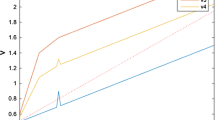Abstract
As an important branch of game theory, coalitional game deals with situations that involve cooperation among the players. This paper deals with this topic further by incorporating the fuzzy payoff information. Based on the credibility theory, we introduce two decision criteria to define the preferences of players, which leads to two definitions of credibilistic cores—the solution of coalitional game with fuzzy transferable payoffs. Meanwhile, we give a sufficient and necessary condition to ensure non-emptiness of the credibilistic cores. Finally, an example is provided for illustrating the usefulness of the theory developed in this paper.
Similar content being viewed by others
References
Aubin JP (1981) Cooperative fuzzy games. Math Oper Res 6:1–13
Aumann R, Maschler M (1964) The bargainning set for cooperative games. Adv Game Theory Ann Math Stud 52:443–476
Blau RA (1974) Random-payoff two-person zero-sum games. Oper Res 22(6):1243–1251
Butnariu D (1978) Fuzzy games: a description of the concept. Fuzzy Sets Syst 1:181–192
Cassidy RG, Field CA, Kirby MJL (1972) Solution of a satisficing model for random payoff games. Manage Sci 19:266–271
Charnes A, Kirby M, Raike W (1968) Zero-zero chance-constrained games. Theory Probab Appl 13(4):628–646
Gao J, Liu B, Gen M (2004) A hybrid intelligent algorithm for stochastic multilevel programming. IEEJ Trans Electron Inform Syst 124-C:1991–1998
Gao J, Liu B (2005) Fuzzy multilevel programming with a hybrid intelligent algorithm. Comput Math Appl 49:1539–1548
Gao J (2007) Credibilistic game with fuzzy information. J Uncertain Syst 1(1):74–80
Gao J (2009) On characterization of credibilistic equilibria in fuzzy-payoff zero-sum game. Soft Comput 13:127–132
Gillies DB (1959) Solutions to general non-zero-sum games. In: Tucker AW, Luce RD (eds) Contributions to the theory of games IV. Annals of Mathematics Studies, vol 40. Princeton University Press, Princeton, pp 47–85
Harsanyi JC (1967) Games with incomplete information played by ‘Bayesian’ player, Part I. the basic model. Manage Sci 14(3):159–182
Harsanyi JC (1968a) Games with incomplete information played by ‘Bayesian’ player, Part II. the basic probability distribution of the game. Manage Sci 14(5):320–324
Harsanyi JC (1968b) Games with incomplete information played by ‘Bayesian’ player, Part III. Bayesian equilibrium point. Manage Sci 14(7):486–502
Liang R, Yu Y, Gao J, Liu ZQ (2010) Credibilistic n-person game with fuzzy information. Front Comput Sci Chin 4(2):212–219
Liu B (2000) Dependent-chance programming in fuzzy environments. Fuzzy Sets Syst 109:97–106
Liu B (2004) Uncertainty theory: an introduction to its axiomatic foundations. Springer, Berlin
Liu B (2006) A survey of credibility theory. Fuzzy Optim Decis Making 5(4):387–408
Liu B, Liu Y (2002) Expected value of fuzzy variable and fuzzy expected value models. IEEE Trans Fuzzy Syst 10:445–450
Liu Y, Liu B (2003) Expected value operator of random fuzzy variable and random fuzzy expected value models. Int J Uncertain Fuzziness Knowl Based Syst 11(2):195–215
Liu Y, Gao J (2007) The dependence of fuzzy variables with applications to fuzzy random optimization. Int J Uncertain Fuzziness Knowl Based Syst 15(Suppl 2):1–20
Liu B (2007) Uncertainty theory, 2nd edn. Springer, Berlin
Mares̆ M (1994) Computation over fuzzy quantities. CRC Press, Boca Raton
Mares̆ M (2000) Fuzzy coalitions structures. Fuzzy Sets Syst 114(1):23–33
Mares̆ M (2001) Fuzzy cooperative games. Physica-Verlag, Heidelberg
Mashler M, Peleg B, Shapley LS (1979) Geometric properties of the kernel, nucleolus and related solution concepts. Math Oper Res 4:303–337
Nishiizaki I, Sakawa M (2000a) Fuzzy cooperative games arising from linear production programming problems with fuzzy parameters. Fuzzy Sets Syst 114(1):11–21
Nishiizaki I, Sakawa M (2000b) Solutions based on fuzzy goals in fuzzy linear programming games. Fuzzy Sets Syst 115(1):105–109
Nishizaki I, Sakawa M (2001) Fuzzy and multiobjective games for conflict resolution. Physica-Verleg, Heidelberg
Shapley LS, Shubik M (1954) A method for evaluating the distribution of power in committee systerm. Am Politics Sci Rev 48:787–792
Schmeidler D (1969) The nucleolus of a characteristic function games. J Appl Math 17:1163–1170
von Neumann J, Morgenstern D (1944) The theory of games in economic behavior. Wiley, New York
Yu Y, Gao J (2008) Credibilistic extensive game with fuzzy information. Technical Report of Renmin University of China
Zadeh LA (1965) Fuzzy sets. Inf Control 8:338–353
Acknowledgments
This work was supported by National Natural Science Foundation of China (No. 70601034).
Author information
Authors and Affiliations
Corresponding author
Rights and permissions
About this article
Cite this article
Shen, P., Gao, J. Coalitional game with fuzzy payoffs and credibilistic core. Soft Comput 15, 781–786 (2010). https://doi.org/10.1007/s00500-010-0632-9
Published:
Issue Date:
DOI: https://doi.org/10.1007/s00500-010-0632-9




